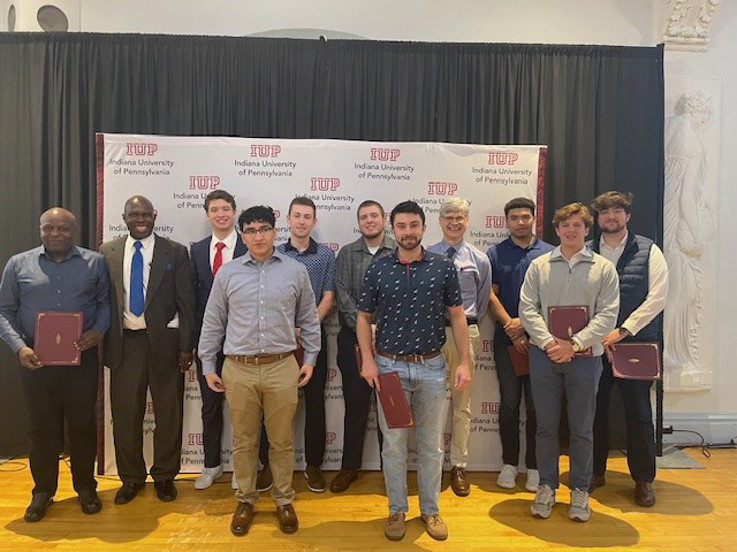
The Department of Finance and Economics (FIEC) is very pleased that student research completed under the direction of several department faculty members was recognized at an awards luncheon held in the Blue Room on April 22, 2024.
Volunteer faculty, alumni, and friends-of-the-university judges attended oral and poster presentation sessions during the 19th Annual Scholars Forum event held earlier in April, and based on their rubric scoring and comments, results were determined for the four award categories. Student award recipients and their FIEC faculty mentors were invited to attend the luncheon.
Eberly College of Business Outstanding Poster Presentation
- Austin Moore (BS—Finance) and Victor River (BS—Finance with Economics double major), “Sector Analysis of Stock Market Volatility” (faculty mentor, Todd Potts)
Moore and River investigate the volatility and behavior patterns of stock market sectors. Through an analysis of eight key sectors during a decade of significant economic challenges, including the 2008 housing crisis and the COVID-19 pandemic, the research highlights the varying degrees of risk and potential returns. Employing the VIX Index to measure volatility, it examines factors such as geopolitical tensions, technological advancements, and regulatory changes, illustrating the complex interplay between sector-specific characteristics and market dynamics.
“We chose our research topic because we wanted a tool that could forecast potential volatility in specific S&P 500 sectors, rather than the entire market to enhance our portfolio holdings,” explains Moore.
Eberly College of Business Outstanding Oral Presentation
- Jacob Holes (BA—Economics/Honors with Supply Chain Management double major) and Nate Zik (BS—Accounting with Economics/Honors double major), “Analyzing Determinants of Major League Baseball Game Attendance” (faculty mentor, James Jozefowicz)
Holes and Zik analyze the determinants of Major League Baseball attendance. Demographic (age and percent of city population with a bachelor’s degree), economic (poverty rate and fan cost index), weather (average yearly rainfall per city and average yearly temperature), and team-based factors (runs per game and winning percentage in the prior year) are studied to determine the main drivers of attendance. Panel data measures these statistics for the 2016-2019 seasons for all 30 Major League Baseball teams. A two-way fixed effects model is used to analyze the data.
Adding background context for their research, Zik says, “My co-author and I have always had an interest in sports, so we decided that analyzing the determinants of MLB attendance would be a very interesting topic.” As encouragement to future students to participate in the Scholars Forum, Holes adds, "Embrace the opportunity to share your ideas at the Scholars Forum—it's a chance to not only present your work but also to inspire others with your passion and knowledge."
Eberly College of Business Dean’s Award (Undergraduate Student)
- John Sieber (BA—Economics) and Myca Torreance (BS—Finance with Economics/Honors double major), “Shooting for Success: An Econometric Analysis of Factors Influencing NBA Salaries” (faculty mentor, James Jozefowicz)
Sieber and Torreance, who also jointly received the 2024 Research Award at the Pennsylvania Sports Business Conference, investigate the multifaceted landscape of National Basketball Association (NBA) player salaries by examining an array of factors that shape compensation. Drawing upon a cross-sectional sample of 381 players during the 2022-2023 season and building on existing literature, this investigation employs the Ordinary Least Squares Regression (OLS) method to understand the relationship between player performance, experience, and remuneration.
Commenting on the coursework for which their research was initiated and developed, Torreance says, “Taking the Introduction to Econometrics and Advanced Econometrics courses was the best decision of my college career. Not only did they allow me to meet new friends with similar interests, but they gave me the ability to develop statistical analysis skills and apply them to a real-world project that has won two awards. With technical skills becoming more desirable in the job market, I can safely say these classes helped build my data analysis skills.”
Eberly College of Business Dean’s Award (Graduate Student)
- James Walubengo Mukaisi (Supply Chain Management-MBA), “Factors Affecting the Average Wage: Challenges for Business Firms.” (faculty mentor, Yaya Sissoko)
Mukaisi examines how education level has a bearing on private sector compensation, particularly through determining the extent to which education levels are distributed across occupation types and by highlighting certain skills of utmost importance concerning them. Regression analysis indicates that having both a bachelor’s degree and a master’s degree or above has a statistically significant effect on average salary for private sectors. Moreover, the research findings suggest specific abilities significantly affect earnings in the private sector.
Citing a quote from Benjamin Franklin, “an investment in education gives the best returns,” Mukaisi says, “This is supported by the regression analysis and findings where the higher the educational attainment, the better the rewards. While on the other hand businesses face different challenges like geopolitical, climate change and macro indicators fluctuation, they are willing to invest in the best talents in the market to make them competitive and sustainable. Labor is one of the key costs in business and a strategic approach is to optimize workforce talent and skills to achieve a maximized return on investment (ROI) in human capital.”